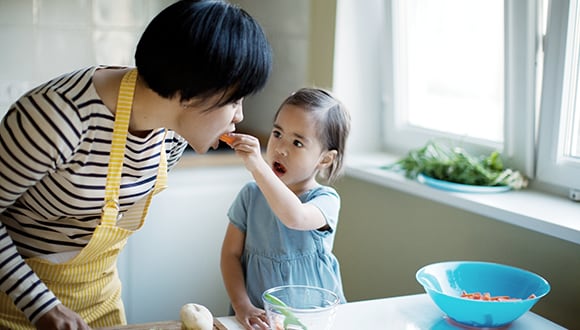Raising vegetarian or vegan kids
Saying no to animal products is on the rise, but is a vegetarian or vegan diet suitable for children?
Health Agenda
May 2017
Over two million Aussie adults are now completely, or mainly, vegetarian, an increase of more than 400,000 since 2012. Australia is also the third fastest growing vegan country in the world.

Advances in nutritional science and the availability of a wider variety of plant-based foods have seen many of the old taboos around giving up meat and animal products fall away.
With research indicating that a vegetarian or vegan diet can lower risks of illness later in life, including cancers, strokes and cardiovascular disease – and ethical considerations – it’s little wonder that more people are choosing a plant-based diet.
While there is greater acceptance of adults choosing to avoid meat, when it comes to what we feed our children, many people worry that they’ll miss out on nutrients essential to growth. How can you build healthy kids if their diet is missing the proteins, iron and vitamin B12 that are packed into meat?
Plan for success
According to Sydney dietitian Shirley Chan, the key to raising healthy vegetarian or vegan kids is a combination of education and preparation. “A plant-based diet is suitable for people of all ages,” she says.
A child can be vegetarian or vegan if their diet is carefully balanced to supply all the nutrients they need. They need more than just micronutrients like vitamins and minerals but also proteins which are needed for growth in childhood.
The composition of proteins in plants are different to those in meat so they need to be combined to provide the building blocks for growth. Careful nutritional planning is particularly crucial when children are first being introduced to food. Chan recommends planning ahead with the aid of a dietitian or accredited nutritionist.
Chan says, “The critical time for children is when they’re being weaned off breastfeeding or formula, while their intake of solid food is being established. It’s important for parents to seek professional advice for meal planning, to ensure adequate nutrition for their children.”
Dietitian Louisa Matwiejczyk, a lecturer at Flinders University, also argues that children suffer no adverse effects from a vegetarian or vegan diet so long as the diet is meticulously planned. In fact, they’re likely to derive plenty of health benefits.
“Research shows that children who are raised as vegetarians grow and develop at the same rate as meat-eaters. They receive mostly the same amount of protein, energy and other key nutrients that children need,” she says. “Adolescent vegetarians tend to have a healthier weight and healthier attitude towards eating than their omnivore counterparts.”
Some studies, while agreeing with Matwiejczyk that vegetarian teenagers tend to be healthier, have found more links between vegetarianism and eating disorders, however, it appears that for many of the subjects of these studies, plant-based diets were adopted in adolescence, often as part of a weight loss plan.
Young vegetarians and vegans can eat well
According to Matwiejczyk, a balanced vegetarian or vegan diet that includes legumes, vegetables, fruit, tofu, nuts and seeds, among other plant-based foods, can usually provide what children need. They can be designed to contain appropriate levels of protein, iron, calcium and fatty acids, such as omega-3, which meat-eaters get from animal products.
Fortified foods and supplements can often make up any shortfall where needed, with calcium-fortified soy or almond milk acting as a good substitute for cow’s milk, for example.
However vitamin B12, which is only found naturally in animal products, is a potential cause of concern. Chan says parents should seek expert advice to prevent their child from suffering any effects of vitamin B12 deficiency, which can include anaemia, shortness of breath, diarrhoea and pins and needles. Talk to an accredited dietitian about planning a vegan diet in particular, and make sure your child has regular GP visits to make sure their development is on track.
Make sure they don’t miss out
One social aspect that can cause alarm is the idea that a child will miss out in some way by being a vegetarian or a vegan, particularly when it comes to parties. But Chan believes that this can be handled easily enough with a bit of prior consideration.
“It’s a matter of creating an inclusive environment, whether it’s in school or at a social event,” she says. In a party situation, parents should speak with the host, “much like they would if their child had an allergy or particular personal or religious belief that influenced food choices.”
And, as vegetarianism and veganism as a dietary choice becomes ever more popular among families, Chan believes it can have plenty of positive knock-on effects.
“A plant-based diet, not only helps with our health, but it also has other impacts, such as environmental considerations and more compassionate treatment of animals,” she says. “And added to that, a life-long plant-based diet can potentially reduce the burden of diseases, such as obesity, cardiovascular diseases, some cancers and diabetes.”
If your family chooses to eat meat as part of an overall balanced diet, it's worth considering making a vegetarian or vegan diet part of your lifestyle for one, two or even more days a week. With so many delicious plant-based recipes available, even for strictly vegan diets, it's easy.